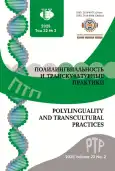Understanding the Law of the Absolute in Modern Intellectual Prose of Kazakhstan: Based on the Novels of H. Adibaev “Constellations of Twins” and D. Nakipov “Circle of Ashes”
- Authors: Ovcherenko U.V.1, Shchennikova N.V.1
-
Affiliations:
- RUDN University
- Issue: Vol 22, No 2 (2025)
- Pages: 353-365
- Section: LITERARY SPACE
- URL: https://journal-vniispk.ru/2618-897X/article/view/326855
- DOI: https://doi.org/10.22363/2618-897X-2025-22-2-353-365
- EDN: https://elibrary.ru/QQDEWT
- ID: 326855
Cite item
Full Text
Abstract
The study is devoted to the study of the reflection of Hegel’s philosophical ideas about the “absolute spirit” and the “absolute idea” in Turkic philosophy, and, as a consequence, in the literature of Kazakhstan in the 21st century. The work demonstrates how Hegel’s teaching, having come to the soil of spiritually oriented Kazakh philosophy, overcoming Hegelian reductionism in the person of the classics of Kazakh national literature (Abai, Makhshur Kopeyev and Magzhan Zhumabayev), turned into the theory of the Absolute, which consolidates the unity and interconnection of each element of reality - from global historical events to personal collisions. An analysis of the reflection of Hegel’s ideas in post-Soviet Kazakhstani prose is carried out using the material of intellectual novels by two translingual writers: Khasen Adibayev “Constellations of Twins” and Dyusenbek Nakipov “Circle of Ashes”. The sources of these works and their main distinctive features, allowing them to be classified as intellectual prose, are revealed. The author’s interpretation of the “work” of the theory of the interconnection of all things in the creative laboratory of these translingual writers is offered. It is shown how Hegel’s ideas, refracted through Adibaev’s perception, were realized in his theory of the Absolute law, which became the event axis of the novel. Understanding the law within the framework of the history of human civilization allows this writer to put at the forefront a person Thinking and seeing the interconnections, interdependence of the past, present and alternative present. It was also analyzed how Nakipov “works” with the Absolute law (Eternal Absolute), opposing the “religion of revenge” to the “religion of love”, dictating the fulfillment of this law through a Loving person. According to Adibaev, the law of the Absolute is fulfilled hourly in the history of mankind, according to Nakipov this law comes into effect only when it must be preserved.
About the authors
Ulyana V. Ovcherenko
RUDN University
Author for correspondence.
Email: ovcherenko1993@gmail.com
ORCID iD: 0009-0004-8706-6906
Candidate of Philological Sciences, teacher of additional education, Department of Russian Language and Intercultural Communication, Institute of Russian Language
6 Miklukho-Maklaya St, Moscow, 117198, Russian FederationNina V. Shchennikova
RUDN University
Email: ninashenn@gmail.com
ORCID iD: 0000-0001-8493-0827
Candidate of Philological Sciences, Associate Professor of the Department of Russian Language and Intercultural Communication, Institute of Russian Language
6 Miklukho-Maklaya St, Moscow, 117198, Russian FederationReferences
- Davydov, Yu. 1997. “Intellectual novel and philosophical mythmaking.” Questions of Literature, no. 9. 4 Apr 2025, https://voplit.ru/article/intellektualnyj-roman-i-filosofskoe-mifotvorchestvo/
- Gelt, M.E. 2013. “Traditions of the intellectual novel in the works of T. Mann and Mr. Hesse.” Humanities and social sciences, no. 4, pp. 123–131. Print. (In Russ.) EDN: RCLQNP
- Altybaeva, S.M. 2018. Kazakh prose of the Independence period: tradition, innovation, prospects. Almaty. Print. (In Russ.)
- Azizova, A.O., and B.U. Dzholdasbekova. 2016. “Intellectual prose of Kazakhstan during the period of Independence.” Bulletin of RUDN. Series: Literary criticism, journalism, no. 1, pp. 89–90. Print. (In Russ.) EDN: VSAPKZ
- Hegel, G. 2000. Phenomenology of Spirit. Translated from German by G.G. Shpet. Moscow: Nauka publ. Print. (In Russ.)
- Kokumbaeva, B.D., and K.K. Begalinova. 2021. “On some aspects of the spiritual space of the Great Steppe in the cultural history of the Kazakhs.” Greater Eurasia: development, security, cooperation, no. 4–1, pp. 367–372. Print. (In Russ.) EDN: ZVZFJY
- Solovieva, G.G., and A. Sagikyzy. 2020. “Kazakh Philosophy of Beauty: Existential Discourse.” Journal club Intelros, Credo New, no. 2. 4 Apr 2025, http://www.intelros.ru/readroom/credo_new/kr2-2020/41812-kazahskaya-filosofiya-prekrasnogo-ekzistencialnyy-diskurs.html EDN: PQOVZY
- Sarsekeyeva, N. 2012. “The role of the tradition of depicting the ‘seeker of truth᾿ in modern literature of Kazakhstan in the context of interethnic dialogue.” Slovo.ru: Baltic accent, no. 2, pp. 66–70. Print. (In Russ.) EDN: PBPVXJ
- Altybaeva, S.M. 2008. “Intertextual connections of modern Kazakh and Russian literature.” MIRS, no. 4, pp. 78–83. Print. (In Russ.)
Supplementary files









